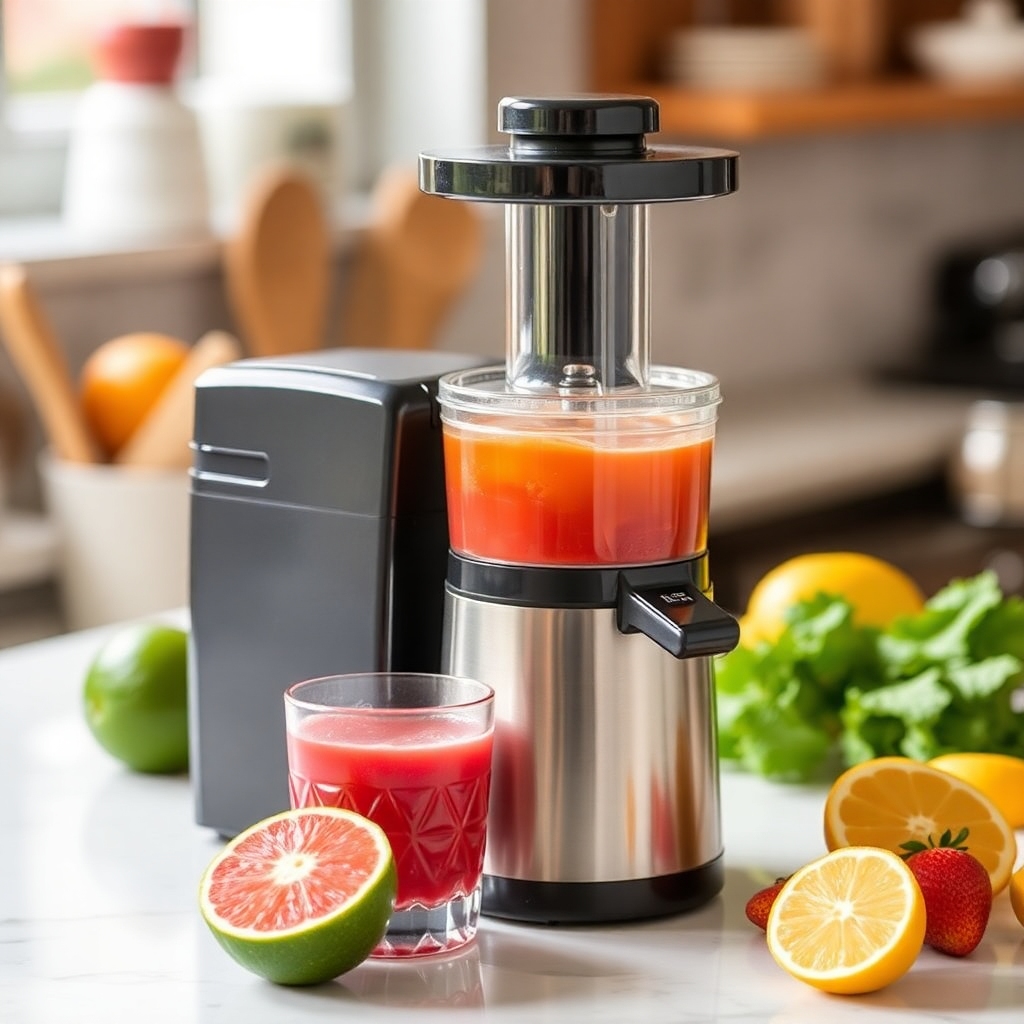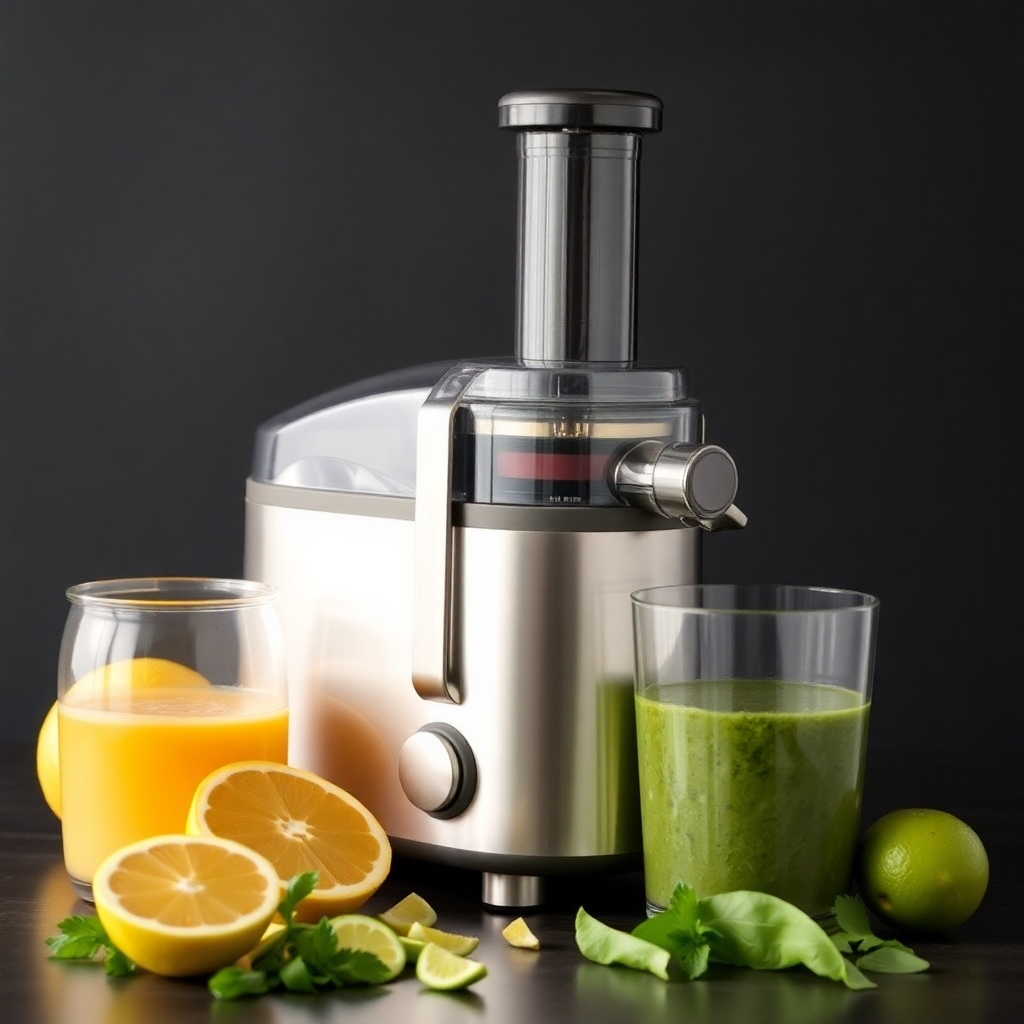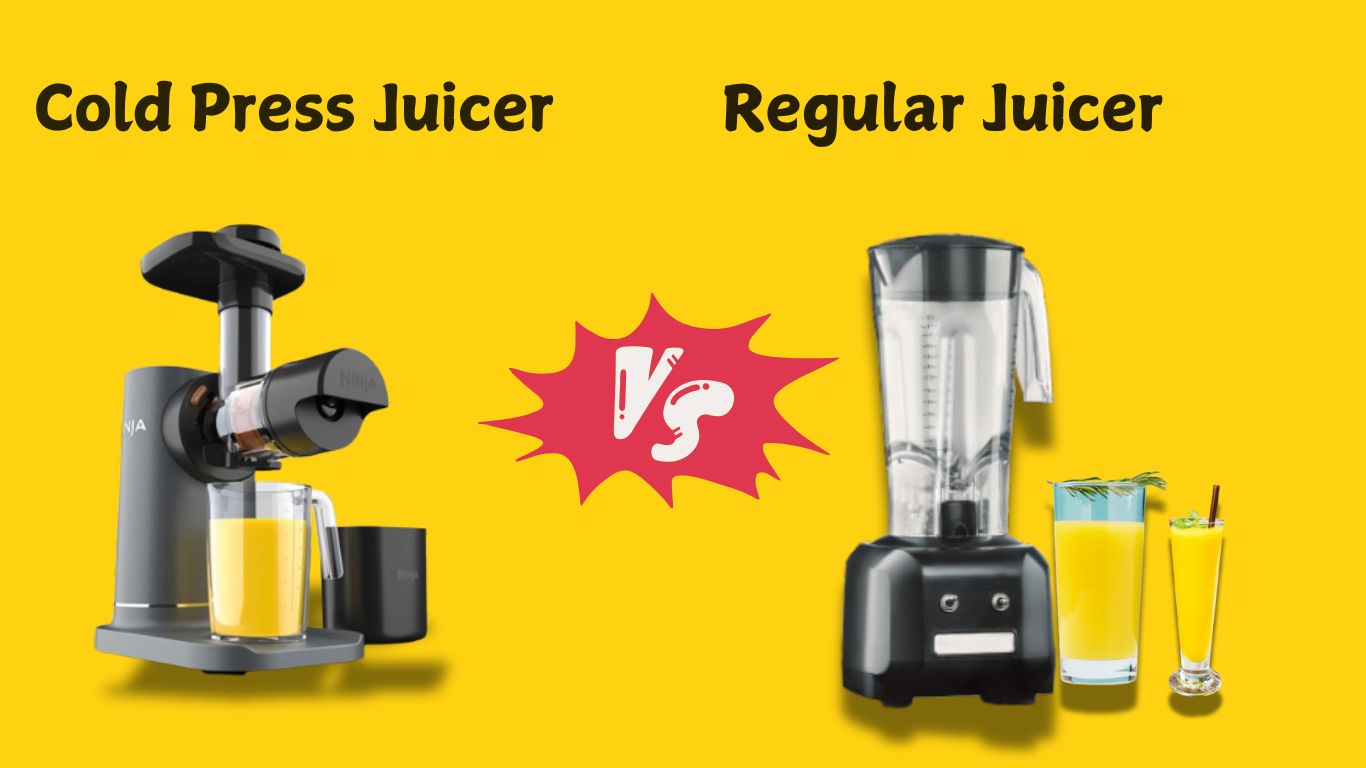
Table of Contents
Lets see what’s the difference between a cold press juicer and a regular juicer? Because Many people consider fresh fruits or their juice as an important part of their morning diet for a healthy and long life. Doctors also say that you should start your day with fresh and nutritious fruit juice. But which juicer should you choose, a cold press or a traditional juicer?
A juicer is an essential tool for anyone who loves to make fresh juices at home, but with so many types available, it is important to choose the right juicer. The two most common types are cold press juicers and regular juicers.
Understanding the difference between these two types of juicers is important for anyone interested in a healthy lifestyle or trying to improve the quality of their juice. This decision can affect both the taste and nutritional content of your juice.
In this article, we will look at the basic differences between cold press juicers and regular juicers, such as their benefits, how they work, and which one is best for your lifestyle. Let’s learn and help you make an informed decision!
What Is a Cold Press Juicer?

A cold press juicer, often known as a masticating juicer, is designed to extract juice gradually and deliberately. Unlike standard juicers, it does not use high-speed spinning blades. Instead, it smashes and presses items to extract juice, generating minimal heat.
How It Works:
Cold press juicers run at a low speed, usually between 40 and 80 revolutions per minute (RPM). This gentle grinding procedure smashes fruits and vegetables, extracting juice without creating much heat. This procedure separates the juice and pulp, resulting in nutrient-dense juice.
Unique Features:
- Operates more silently than comparable juicers.
- Produces juice with minimum froth and oxidation.
- Contains additional vitamins, minerals, and enzymes.
- Can handle a broad range of ingredients, including leafy greens.
What Is a Regular Juicer?

Regular juicers, also known as centrifugal juicers, are the most traditional form of juicer. They shred fruits and vegetables using high-speed spinning blades, then separate the juice from the pulp using centrifugation.
How It Works:
Regular juicers work at high speeds, usually between 3,000 to 10,000 RPM. The rotating blades cut through the produce, and centrifugal force drives the juice through a small mesh, ejecting the pulp into a separate container. The method is rapid, but it produces heat, which may alter the nutrients in the juice.
Common Types of Regular Juicers:
- Centrifugal juicers: These are the most popular and adaptable for typical juicing purposes.
- Citrus juicers: Specialised in juicing citrus fruits such as oranges, lemons, and grapefruits.
What is Difference Between A Cold Press Juicer And A Regular Juicer
Key Differences | Cold Press Juicers | Regular Juicers |
| Mechanism of Extraction | Use a slow grinding and pressing method to extract juice with minimal heat and oxidation. | Use high-speed blades and centrifugal force to separate juice, producing more heat. |
| Nutrient Retention | Retain a higher level of nutrients, enzymes, and antioxidants due to the slow process avoiding heat and oxidation. | Heat generated during operation can cause some nutrient loss, particularly in sensitive vitamins like vitamin C. |
| Juice Quality | Produce thicker, richer juice with a longer shelf life (up to 72 hours in the fridge). | Juice separates quickly, has more foam, and should be consumed immediately for the best quality. |
| Speed | Operate slower, making the juicing process more time-intensive. | Work quickly, ideal for those with busy lifestyles. |
| Versatility | Can handle a variety of ingredients, including leafy greens, wheatgrass, and nuts. | Perform well with fruits and hard vegetables but struggle with leafy greens. |
Advantages And Disadvantages
| Aspect | Cold Press Juicers | Regular Juicers |
| Advantages | 1) Retain more nutrients for healthier juice. 2) Quieter operation, suitable for early mornings. 3) Can juice a wider variety of ingredients, including leafy greens and nuts. 4) Juice stays fresh longer due to minimal oxidation. | 1) Quick and efficient, suitable for people in rush situations. 2) Affordable and widely available. 3) Easy to use and suitable for beginners. |
| Disadvantages | 1) Slower juicing process, which can be time-consuming. 2) Typically more expensive than regular juicers. 3) More components, making them harder to clean. | 1) Reduced nutrition retention because of heat and oxidation. 2) Noisy operation. 3) Struggles with certain ingredients like leafy greens and nuts. 4) Juice has a shorter shelf life. |
Is Cold Press Juicer Better?
Your ideal juicer depends on your priorities:
Health Enthusiasts: If nutrient preservation is key, a cold press juicer is worth the investment.
Busy Individuals: For quick and convenient juicing, a regular juicer may be more suitable.
Budget-Conscious Buyers: Regular juicers are a more affordable option for casual juicers.
Versatile Users: Cold press juicers offer more functionality for a wider variety of recipes.
Cost Comparison
Initial Investment
Cold press juicers generally cost $200 to $500.
Regular juicers can cost as little as $50 to $150.
Long-Term Value:
While cold press juicers have a higher upfront cost, they often prove more cost-effective in the long run due to higher juice yield and better nutrient retention.
Maintenance and Cleaning
Cold Press Juicers:
Cold press juicers have more components to clean. Cold press juicers often have many components, such as an auger (screw), a filter, a juice container, a pulp container, and, in rare cases, a nut milk strainer. Cleaning these parts may take longer and require more work than normal juicers. To prevent pulp or debris from becoming lodged and generating buildup, remove the juicer and carefully clean each part.
Cleaning tools:
Many cold press juicers have unique cleaning accessories to make the procedure easier. Brushes or scrapers may be among the equipment used to remove pulp and other material from difficult-to-reach locations. Despite the extra work necessary for cleaning, these products can save you time and increase efficiency.
Frequent Cleaning:
Because cold press juicers work slowly and thoroughly, they might acquire more pulp and residue. This means you’ll need to clean them after each usage to ensure peak efficiency and avoid mould and bacteria growth.
Regular Juicers:
Fewer components: Regular (centrifugal) juicers typically have fewer components than cold press juicers. The major components are usually the motor base, a spinning blade or disc, a juice container, and a pulp collector. With fewer pieces to clean, the whole cleaning procedure is quicker and easier.
Less Maintenance Required:
While traditional juicers are easy to clean, they may need to be serviced more frequently owing to pulp and residue building. The high-speed spinning blades might leave behind more pulp, which can block the filter or juice spout, requiring extra maintenance. Regular cleaning is necessary to guarantee smooth performance and prevent clogs.
Frequent Pulp Removal:
Because conventional juicers process materials quicker, they generate more froth and pulp, so you may need to empty the pulp container more frequently. This can make maintenance more time-consuming, particularly if you’re juicing in big quantities.
Summary:
Cold press juicers can be difficult to clean because of their many components; however, cleaning kits are supplied to make the process easier.
Regular juicers are easier to clean since they have fewer components, but they may need more frequent maintenance to remove pulp and guarantee effective operation.
In any case, regular cleaning and maintenance are required to keep your juicer in excellent operating order, although cold press juicers usually take more effort because of their design.
Common Myths About Juicers
All Juicers Are the Same: Cold press and normal juicers provide widely varying results in terms of juice quality, nutritional retention, and processing time.
Juicers are difficult to clean: Many current juicers contain features that make cleaning easier, such as detachable components and cleaning tools.
Cold Press Juicers Are Too Slow: Although cold press juicers run at a slower pace, the better quality juice they produce, with more nutrients and a longer shelf life, makes the wait worthwhile.
Conclusion
Both cold press and normal juicers have advantages and disadvantages. A cold press juicer is the best option if you want to preserve nutrients, produce high-quality juice, and be versatile.
However, if speed, price, and convenience of use are your key considerations, a standard juicer may be better suited. Regardless of the option you pick, purchasing a juicer is a step towards a better living.
What fruits and vegetables work best in a cold press juicer?
Leafy greens, hard vegetables like carrots, and soft fruits such as berries are ideal.
Can I use a regular juicer for leafy greens?
Regular juicers struggle with leafy greens and often produce less juice from them.
How often should I clean my juicer?
Clean your juicer after every use to prevent residue buildup and maintain hygiene.
Is cold press juice worth the higher cost?
Yes, especially for those prioritizing nutrition and juice quality.
Can I make nut milk with a regular juicer?
No, only cold press juicers are suitable for making nut milk.
